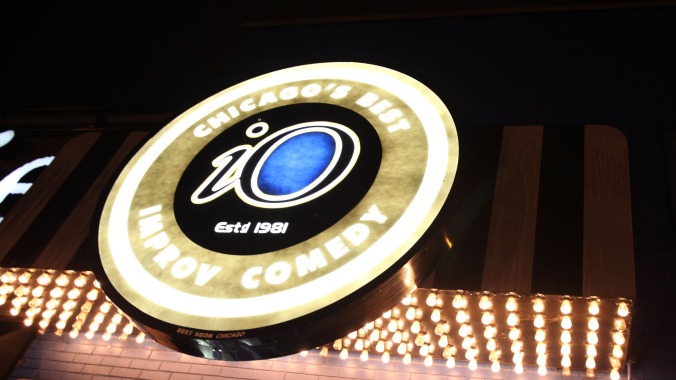A mainstay of the Chicago improv community, iO—formerly ImprovOlympic, until it turned out that the International Olympic Community has absolutely no sense of “yes and” about potential infringements on its trademarks—was founded by Halpern and improv guru Del Close, whose line of apostolic comedy succession runs through everyone from Tina Fey to Bill Hader to the founders of the UCB. Operating both a theater and a training center—in which students were taught both the theater’s signature improv form, “The Harold,” and also not to make a phone with your fingers if you’re trying to mime a call on stage—iO operated in Chicago since 1981. Several of those years were spent in a building just a block from Wrigley Field, allowing students, performers, and fans alike to get the true Chicago experience of trying to elbow your way past an entire legion of drunk Cubs fans all screaming at the top of their lungs, just so that you could catch a top-tier performance by Deep Schwa or TJ & Dave. The theater also expanded, for a time, into Los Angeles and North Carolina, but those ventures were eventually shuttered a few years back.
As its alumni rolls suggest, iO was a key talent incubator in the world of comedy, with its former students dotting the casts and writers’ rooms of any number of big-budget Hollywood projects. (Also, if nothing else, its training center deprived hundreds of attention-seeking twentysomethings of thousands upon thousands of dollars that they probably would have just spent on drugs.) The theater, and Halpern, have been periodically criticized for some of their practices—including as recently as earlier this month, when more than 2,500 people signed a petition calling for Halpern to address institutional racism at the theater, and hand off some of her near-absolute decision-making power to other members of the community. But those concerns, and the strident desire for the theater to be better than it so often was, were also an acknowledgement of how huge iO loomed in the world of Chicago comedy—a vacuum that others in the city will now have to find a means to fill.

 Keep scrolling for more great stories.
Keep scrolling for more great stories.
